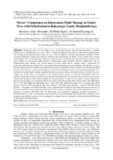Nurses’ Competence on Intravenous Fluid Therapy in Under-Fives with Dehydration in Kakamega County HospitalsKenya
Abstract
Worldwide, there are two billion cases of diarrheal disease that kill approximately 1.5 million children due to dehydration every year, which is treated by fluid and electrolytes replacement. Inappropriate use of intravenous fluids therapy occurs in up to 20% of children receiving fluid therapy leading to brain overload, pulmonary edema, heart failure, embolism and renal failure. In Kenya, 17% of under-fives develop complications due to inappropriate intravenous fluid therapy. Anecdotal and empirical reports indicate that many children on intravenous fluid therapy in Kakamega county hospitals develop complications due to inappropriate fluid therapy. The overall objective of this study was to evaluate nurses’ competence on intravenous fluid therapy in under-fives with dehydration in Kakamega County Hospitals. Specifically, to assess the knowledge of nurses on intravenous fluid therapy and to examine the practice of nurses’ on intravenous fluid therapy. The study was conducted in Kakamega County General Hospital and six sub county hospitals that were randomly selected. Simple random sampling method was used to select participants from each facility to get a sample size of 200 nurses. A descriptive cross-sectional study design was adopted. Quantitative data was collected using observational checklists and structured questionnaire. It was then coded, entered in excel sheet, cleaned and analyzed using Social Package for Social Sciences version 23. Chi-square, logistic regression, mean and percentages were employed. The results of the study showed that 88% of nurses had “low Knowledge level”, 12% had “Moderate knowledge level “while none had “High Knowledge level” on intravenous fluid therapy. 65.5 % of the respondents had “Fair practice” 22% had “poor practice”, while 12.5% had “good practice”. Chi square test showed that there was a statististically significant association between the practice of the nurses and the level of education attained (p<0.05). Logistic regression showed that education level was a predictor of practice OR 2.965; 95% CI. Knowledge was statistically significant predictor of practice as indicated with a p< 0.05. In conclusion, nurses, had low level of knowledge and fair practice. Therefore, more trainings and refresher courses were recommended to enhance nurses’ competence on intravenous fluid therapy in under-fives with dehydration.
Collections
- Journal Articles [411]

